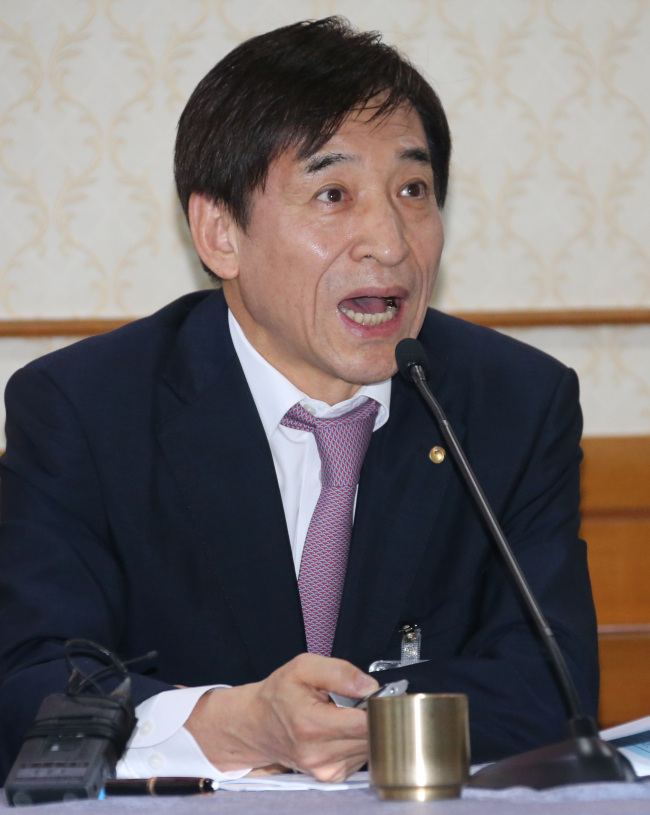The chief of South Korea’s central bank on Tuesday raised worries that a weakening yen may hurt local exporters, reiterating the currency issue that he addressed earlier this month.
BOK Gov. Lee Ju-yeol told lawmakers that additional easing by central banks in the European Union and Japan may add further pressure on the won-yen exchange rate, eroding the competitiveness of exporters.
“Despite the weakening yen, there have not yet been many difficulties (for Korean firms). The weakening yen has boosted profit at Japanese companies. If they leverage their improved profitability, the situation may change,” Lee said in a seminar.
The latest remarks come after the BOK chief mentioned the issue in a Sept. 12 news conference following the policy decision to hold the base rate at 2.25 percent for this month.
BOK Gov. Lee Ju-yeol told lawmakers that additional easing by central banks in the European Union and Japan may add further pressure on the won-yen exchange rate, eroding the competitiveness of exporters.
“Despite the weakening yen, there have not yet been many difficulties (for Korean firms). The weakening yen has boosted profit at Japanese companies. If they leverage their improved profitability, the situation may change,” Lee said in a seminar.
The latest remarks come after the BOK chief mentioned the issue in a Sept. 12 news conference following the policy decision to hold the base rate at 2.25 percent for this month.

Lee told reporters then that while the impact of the won-yen exchange rate on the local economy has weakened, the yen’s continued depreciation may hurt exporters if their Japanese counterparts step up price competition.
Lee said that “volatility in the global financial market” is the biggest risk in making monetary policy decisions, noting how the policies of major economies are moving in different directions.
“The yen is likely to weaken while the dollar likely will strengthen. Things will become more complicated. We plan to address the issues appropriately,” said Lee.
The BOK governor also stressed the importance of measures to prop up growth.
The central bank took part in the government’s growth initiative by lowering the base rate and increasing its corporate loan facility, but additional measures are needed as the country faces structural issues that may derail growth, he said.
Rapid aging and low participation of women in the workforce have been cited as potential risk factors for Asia’s fourth-largest economy.
Lee said that while the impact of the rate cut and the government’s eased rules on mortgage lending are “yet unknown,” the central bank will keep tabs on the country’s household debt trend.
Household lending at local banks increased at the fastest pace in 14 months in August, raising fears that the recent government policies may stoke the country’s already-bulky household debt.
The BOK chief, however, credited the sharp surge to a rise in increased demand for a policy loan program rather than the relaxed mortgage rules that went into effect on Aug. 1. (Yonhap)



![[AtoZ into Korean mind] Humor in Korea: Navigating the line between what's funny and not](http://res.heraldm.com/phpwas/restmb_idxmake.php?idx=644&simg=/content/image/2024/04/22/20240422050642_0.jpg&u=)
![[Exclusive] Korean military set to ban iPhones over 'security' concerns](http://res.heraldm.com/phpwas/restmb_idxmake.php?idx=644&simg=/content/image/2024/04/23/20240423050599_0.jpg&u=20240423183955)



![[Graphic News] 77% of young Koreans still financially dependent](http://res.heraldm.com/phpwas/restmb_idxmake.php?idx=644&simg=/content/image/2024/04/22/20240422050762_0.gif&u=)
![[Herald Interview] Why Toss invited hackers to penetrate its system](http://res.heraldm.com/phpwas/restmb_idxmake.php?idx=644&simg=/content/image/2024/04/22/20240422050569_0.jpg&u=20240422150649)





![[Exclusive] Korean military to ban iPhones over security issues](http://res.heraldm.com/phpwas/restmb_idxmake.php?idx=652&simg=/content/image/2024/04/23/20240423050599_0.jpg&u=20240423183955)



![[Today’s K-pop] Ateez confirms US tour details](http://res.heraldm.com/phpwas/restmb_idxmake.php?idx=642&simg=/content/image/2024/04/23/20240423050700_0.jpg&u=)